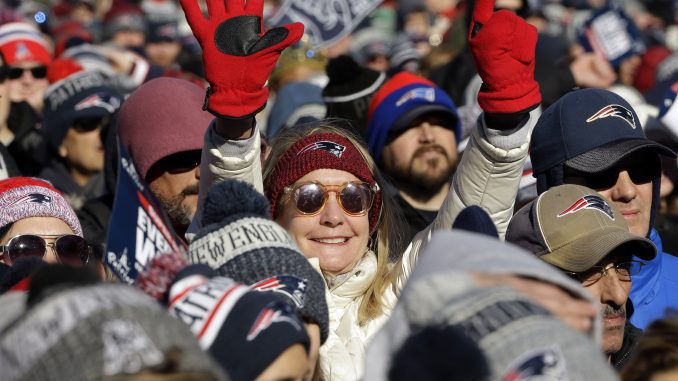
Sunday’s New England Patriots-Kansas City Chiefs game drew 53.9 million viewers to CBS—a shocking 27 percent increase from last year and the most-watched NFL game outside of the Super Bowl in five years. This is in part because they used to call the Dallas Cowboys “America’s Team,” but the Patriots seem like “America’s Most Hated Team.”
Earlier that day on Fox, the Los Angeles Rams’ controversial referee-marred defeat of the New Orleans Saints had 44.1 million viewers—a 4.3 percent gain and Fox’s most-watched program since Super Bowl 51 in 2017.
It’s not just the playoffs. Ratings for NFL regular-season games rebounded, gaining 5 percent over the previous season. That’s not as amazing, since it’s a small increase after two years of frightening declines. But in today’s ever-declining ratings for broadcast TV, due to livestreaming and cord cutting, the NFL is still a dominant player, far outdrawing regular scripted TV shows.
The panic in NFL offices has ended. The bleeding stopped. Everyone knows why, and it’s not the powerful high-scoring offenses and the snazzy touchdown celebrations.
The NFL put an end to the national anthem kneeling protests. The focus could then return to sports, not silent gestures meant to drive home the leftist argument that we should be deeply ashamed about how America is horribly racist and police officers are a pack of murderers. This controversy drove away viewers on both sides of the debate, the patriotic Americans and the “woke” community. A Media Research Center poll found that 74 percent of likely voters said they were “trying to get away from politics and do not want to be bombarded with partisan political messages” in their sports and entertainment shows.
In the background, the radicals keep ranting about a “boycott” of quarterback Colin Kaepernick (even though some of his kneeling chums, like safety Eric Reid, returned to the game). Everyone in the media adored Kaepernick’s high-profile turn in a Nike ad, and the ABC sitcom “Black-ish” celebrated him as a civil rights icon. These activists in the media avoid Kaepernick’s actual on-field decline, and his offensive statements, like when he wore socks that depicted cops as pigs, and when he called the police a “fugitive slave patrol” that needs to be “dismantled.”
Athletes should feel free to make these wild-eyed lectures in their ESPN interviews—and ESPN would revel in it. The network’s political tilt is part of why it lost another 2 million subscribers in 2018. It now has 86 million subscribers, down from over 100 million just eight years ago.
If being a wealthy and prominent athlete goads you into standing up for people who aren’t as fortunate as you, there are plenty of forums … just not the field. This way, people tuning into the games can just focus on the action.
But athletes should also keep in mind that people get tired of celebrities being treated as the wisest of statesmen just because they’re talented at something else other than politics. Too often, it’s considered beyond the pale to rebut them or fact-check them or—especially—suggest they’re ungrateful for everything they have received in this terrific country we live in.
Brent Bozell III is the president of the Media Research Center. Tim Graham is director of media analysis at the Media Research Center.

